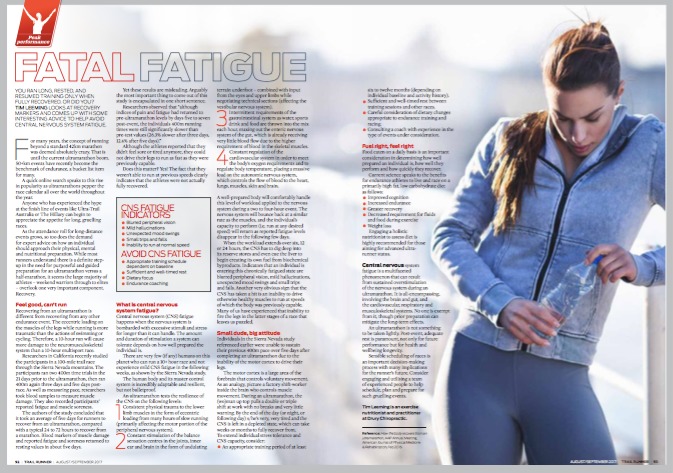Tim Leeming. Exercise Nutritionist. BAppSci (Hons)
The ultramarathon is abuzz right now. In the past five to 10 years, events exceeding 42km that were previously deemed “absolutely crazy” have become – for some – the benchmark of endurance and – for others – a “must” on the bucket list. You only need to search your local running calendar to realise this rise in popularity as new 50+ kilometre events are increasingly more common throughout the year and all over the world. I’d suggest you get down to the finish line of events like Kepler Challenge or The Hillary to experience the hype and sheer demand for such long and gruelling races.
Recovering from an ultramarathon is like no other endurance event. The eccentric loading on the muscles of the legs while running is more traumatic than the actions of swimming or cycling. Therefore, a 10-hour run will cause more damage to the neuromusculoskeletal system than if that same person completed a 10-hour ironman or multisport race.
Researchers out of California recently ran a study (pun intended) with participants of a 100-mile trail race through the Sierra Nevada Mountains of Northern California. The participants ran two 400m time trials in the 21 days prior to the ultramarathon, then ran the 400m again at three days and five days post-race. As well as measuring time for 400m, the researchers took blood samples to measure muscle damage and recorded the participants reported fatigue and muscle soreness.
The authors of the study concluded that it took an average of five days for runners to recover from an ultramarathon, compared to the typical 24 to 72 hours that an individual will take to recover from shorter events like the marathon. It seems crazy to call a marathon short. This meant that blood markers of muscle damage, as well as reported fatigue and soreness, returned to resting values in about five days (compared to just a few days after a marathon).
Unfortunately, these results can be very misleading. Arguably the most important thing to come out of this study is a short sentence remarking on one particular observation without discussing it any further. The researchers observed that “although indices of pain and fatigue had returned to pre-ultramarathon levels by days five to seven post-event, the individuals 400m running times were still significantly slower than pre-test values (26.3% slower after three days, 12.4% after five days).” Although they didn’t feel sore or tired anymore, the participants could not drive their legs to run as fast as they were previously capable. Does this matter? Yes! Does it indicate these athletes were actually fully recovered? Not at all! Why weren’t they able to run fast yet if they weren’t sore anymore?
Central nervous system (CNS) fatigue.
CNS fatigue is what happens when you bombard your nervous system with excessive stimuli and stress for longer than it can handle. How much stimulation and for how long exactly? Well that depends on how well prepared someone is. There are very few, if any humans on this planet, however, who can run a 10+ hour race and not go through at least a mild phase of central nervous system fatigue in the weeks following that event. The Sierra Nevada study provides good evidence of that, with runners failing to reach the speeds they were capable of before the ultra event, despite not having any more muscle soreness or fatigue.
The human body and its master control system (the CNS) is incredibly adaptable and resilient, but it is not bulletproof. The ultramarathon tests the resilience of the central nervous system in so many unique and different ways all at once:
- Consistent physical trauma to the lower limb muscles in the form of eccentric loading from many hours of slow running (primarily affecting the motor portion of the peripheral nervous system)
- Varied ongoing stimulation of the balance sensation centres in the joints, the inner ear and the brain in the form of undulating terrain underfoot and typically additional input from using the eyes and the upper limbs to negate technical sections on hands and knees (affecting the vestibular nervous system)
- Intermittent requirements of the gastrointestinal system as water, sports drinks and food (or puree) is thrown into the mix each hour (maxing out the enteric nervous system of the gut which is already receiving very little blood flow due to the higher requirement of blood in the skeletal muscles)
- Constant regulation of the cardiovascular system in order to meet the oxygen requirements of the race and to regulate body temperature (placing a massive load on the autonomic nervous system which controls the flow of blood to the heart, lungs, muscles, skin and brain)
When this sort of workload is applied to the nervous system during a two or four-hour event, a well prepared body will comfortably handle it. That is, the nervous system will bounce back at a similar rate as the muscles and so the individual’s capacity to perform (i.e. run at any desired speed) will return as the reported levels of fatigue disappear in the following few days. When the event is many hours longer – 6 hours… 12 hours… 24 hours – the central nervous system has to go deep into its reserve stores and even cue the liver to begin creating its own fuel from biochemical by-products. Good indicators that you are going into such a state are things like the blurred peripheral vision, mild hallucinations, unexpected mood swings or small trips and falls that many of us have experienced in the later hours of a 50+ kilometre event. Another very obvious sign that the nervous system has taken a hit is an inability to drive otherwise healthy muscles to run at speeds the body was previously capable of!
The failure of the individuals in the study we’ve discussed to be able to run at the same speed for 400m as they could before the ultramarathon is due to the inability of the motor cortex to drive the legs. The motor cortex is a large area of the forebrain that controls voluntary movement. As an analogy, picture a little man up in your head – a factory shift worker – who runs the master controls over your muscles, when they move, and the way they move. When you run an ultramarathon, the little man up top ends up having to pull a double or triple shift at work with no breaks and very little warning. By the end of the day (and/or night) he’s very, very tired and he’s left a big mess and a whopping backlog of jobs needing done. The central nervous system is left in a depleted state, one which takes weeks or even months to fully recover from.
Now, of course there are ways to make this “little man up top” a much more reliable, long-lasting worker. An appropriate training build-up of six to twelve months (depending on the individual) is a fantastic place to start and to be guided through this by a coach with experience in these events comes highly recommended. Sufficient and well-timed rest between training sessions and other races is absolutely paramount in the consideration of a training programme for an ultramarathon; again, a coach will put your mind at ease here.
The food that you eat on a daily basis is the next most important consideration in determining how well prepared you are, how well you perform at the ultra and how well your body recovers. That’s right, your nutrition determines how soon after the event you will be able to run distances and paces you were capable of prior to the race. Certainly more recently, the science is showing us how beneficial it is for endurance athletes to live and race on a primarily high fat, low carbohydrate diet. These benefits are multiple, with evidence for improved cognition, increased endurance, greater recovery, decreased requirement for fluids and food during exercise and even weight loss. Getting some help from a holistic nutritionist to assess your diet is also something that comes highly recommended if you’re hoping to achieve “ultra runner” status.
Central nervous system fatigue is a multifaceted phenomena that can result from a sustained overstimulation of the nervous system during an ultramarathon. It is all encompassing, involving the brain, gut, cardiovascular system, respiratory system and, of course, the musculoskeletal system. No one is exempt from it, though prior preparation can mitigate its long term effects. The major take home message for runners of all abilities is that an ultramarathon is not something to be taken lightly. Adequate rest is paramount; not only for future performance but for the longevity of your health and wellbeing. Scheduling these races in your own racing calendar is an important decision making process with many implications for your future as a runner and human being. Consider utilising a team of experienced people that you trust to help schedule, plan and prepare for such gruelling events!
References
HOW THE BODY RECOVERS FROM AN ULTRAMARATHON AAP Annual Meeting, Feb-2016; American Journal of Physical Medicine & Rehabilitation, Feb-2016





